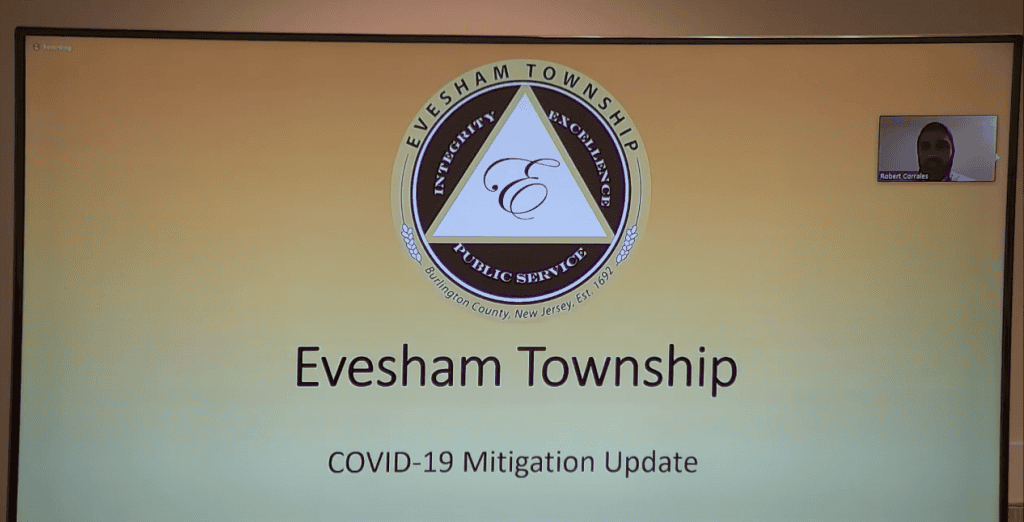

During Evesham Township Council’s May 5 virtual meeting, Township Manager Robert Corrales debuted a comprehensive COVID-19 mitigation plan.
Mayor Jaclyn Veasy asked Corrales to make the presentation, which utilized data provided by the township’s financial advisors.
“[This will] present to our council and our residents how we will work through the financial impact that COVID-19 is going to have on our community,” she explained.
Corrales emphasized that the pandemic has been a world health tragedy and a disruption of everyday life at a global level, and added that even those most well-prepared couldn’t have anticipated what has happened — or what’s to come.
He walked the meeting audience through the township’s response so far, beginning with its early March adaptation to federal, state and county health and policy guidelines and its initial efforts to cancel upcoming events. The most recent shift in policy allowed township employees to return to municipal buildings on a staggered one week on/one week off schedule; out of an abundance of caution, however, the facilities remain closed to the public.
In addition to the overall havoc COVID-19 has caused, Corrales noted its obvious impact on the township’s finances. A sudden stop in expected revenue streams has resulted in an “unforeseen decline in revenue” over almost two months, as, among other things, courts have been closed, licensing has stopped and golf course fees aren’t collected. All told, Evesham Township’s approximate loss of revenue is $545,400, which Corrales said was “just the tip of the iceberg.”
“The numbers are hard to fathom — and also hard to calculate because this is just the beginning,” he explained. “We’re finalizing our 2020 budget, and two months ago, we had a different outlook.”
Corrales also warned that unprecedented times present unknowable factors that further complicate predictions on how the township and its residents will recover, what they have to prepare for and when a clear post-pandemic timeline can be presented.
With so many families facing financial insecurity or uncertainty, even a small decrease in the township’s tax collection percentage would have a considerable impact on that once reliable revenue. A .25-percent drop could mean a decrease of $323,000 in revenue for the township; a 1-percent decrease could mean a $1,487,750 loss.
“I’m not saying this is going to happen, but it could very well happen,” Corrales warned. “Our third and fourth quarters are going to be unknown. … These are things that we need to be prepared for and this is something we have to take into consideration as we move forward.”
To compensate for its losses, the township has two options: Increase revenue streams or cut spending. While some standard avenues of revenue will be available once life settles back into a regular routine again, Corrales said it’s imperative to minimize township spending to account for an uncertain future.
“We still have to do everything in our power to align spending with unexpected revenue losses without impacting the residents by way of tax increases,” he added. “The township has a duty to act in the best interest of all of its residents.”
The current state of the projected 2020 municipal budget includes a surplus the township has used to balance its budget in previous years, though Corrales advised against a short-term solution that could create additional — and potentially bigger — problems down the line.
“It would be a careless course of action to blow through the large portions of the township’s surplus to compensate for the current losses, as doing so is merely just a Band-Aid approach to stop the current bleeding,” he said. “If we’re to use any funds from the surplus, we would have to find new revenue to replace that money next year.”
An immediately implementable, multifaceted approach to minimize the impact of recovery on the township’s residents and staff includes: freeze discretionary spending, reduce non-essential operating expenditure and capital projects, continue work with the Office of Emergency Management to obtain FEMA reimbursement, identify grant opportunities and explore opportunities for shared services within Burlington County.
A reduction in township employee hours is also one of the measures the township has reluctantly taken to reduce costs, and discussions with both labor legal counsel and union representatives are ongoing to find a temporary, mutually agreed-upon solution.
Time is of the essence, Corrales reminded everyone, as “the township has a very narrow window to implement mitigation measures to offset COVID-19 revenue losses with little to no long-term impact on township employees.” Ensuring that reduced hours do not affect employee benefits, especially medical coverage in the midst of a worldwide health crisis, is a priority for all parties involved in the talks.
Corrales also highlighted new programs like a Pandemic Employee Assistance (PEA) increase, which hikes weekly unemployment benefits by $600 under the Coronavirus Aid, Relief, and Economic Security Act, though that federal enhancement expires July 31.
In the end, the best way to combat the unknown is to take immediate action to help reduce both spending and individual risk to residents and employees alike.
“It will result in significant savings that will help the township mitigate our losses without doing so by massive tax increases,” Corrales concluded. “Failure to act now, in a time when these additional enhancements are in place, may lead to taking additional measures that could permanently create historic reductions in the future.”
Those interested in watching Corrales’ presentation can view the video here, which begins at the May 5 council meeting’s 52:38 mark.









